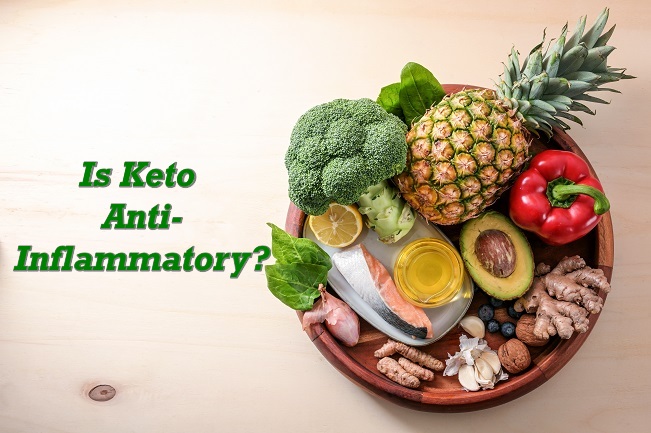Is keto anti-inflammatory? It’s a question that people dealing with inflammation in the body often ask. The ketogenic diet is one of the most popular weight loss diets today. But, aside from weight loss, the diet also offers many other health benefits. It is also believed to be anti-inflammatory.
If you follow the keto diet, you have to significantly reduce your carbs or sugar intake to get into the state of ketosis and start losing weight. But reducing your carb consumption can also mean reducing foods that feed inflammation.
Related Reading: How Ketosis Works for Burning Fat Faster?
One of the first things you will notice when you begin to avoid carbs is you will quickly drop some initial weight. It’s like your body is saying goodbye to the bloat that comes with inflammation.
Related reading: How To Cut Out Carbs Without Going Full Keto?
But before you start to switch to the keto lifestyle, there are many things you need to know about keto and inflammation. If you find yourself wondering, is keto anti-inflammatory, then this article is for you.
What Is Inflammation?
Inflammation is our body’s natural response to infection and injury. Your body’s white blood cells get released into your body to fight the bacteria, organisms, viruses, and anything foreign that your body considers a threat.
The inflammatory process is the body’s way of protecting and repairing injuries and damaged tissues. It starts the healing process
Once the infection or injury is dealt with then the inflammatory process should die down. When it doesn’t then it becomes chronic.
While inflammation is an important process to keep our body protected, too much or chronic inflammation leads to several health issues, including swelling, fatigue, muscle and joint pain, headaches, and more.
What’s worse is that many disorders such as cancer, heart disease, asthma, rheumatoid arthritis, type 2 diabetes, Parkinson’s, Alzheimer’s, and several autoimmune diseases are associated with chronic inflammation.
According to Dr. Barry Sears, proponent and author of The Zone diet and has spent decades studying chronic inflammation,
“The first phase of inflammation causes cellular destruction, and the second phase, resolution, begin cellular rejuvenation. As long as those phases are balanced, you stay well.”
Unfortunately, the balance never happens for most of us. That’s because our diet is often filled with processed foods full of refined grains, sugar and refined unhealthy fats.
All these foods can trigger an inflammatory immune response, which means your body would get inflamed each time you eat these foods.
Is Keto Anti-Inflammatory?
The reason many people are asking is keto anti-inflammatory is because most of the foods in the keto diet are naturally anti-inflammatory. Also, when you follow the diet, you have to avoid carbohydrates. These are foods that are known to cause inflammation.
To give you an idea, here are some keto-friendly foods that have anti-inflammatory properties.
- Avocados and avocado oil
- Broccoli
- Cauliflower
- Chard
- Collards
- Eggs
- Fish (tuna, salmon, herring)
- Kale
- Olive oil
- Spinach
If you want to benefit from the keto diet’s ability to treat inflammation, it’s not enough that you eat the good stuff. You also benefit by limiting your consumption of the bad stuff. These include sugars, processed grains, and starchy carbs.
How Ketones Help Fight Inflammation
On the keto diet, the goal is to put your body in a state of ketosis. When you are in ketosis, your body will be producing ketones. These have been associated with activating the genes that minimize oxidative stress and improve mitochondrial function.
In addition, being in a state of ketosis will activate the AMPK (activated protein kinase), which helps to inhibit the inflammatory Nf-kB pathways.
If you want to get technical Nf-kB (nuclear factor kappa-light-chain-enhancer of activated B cells) refers to a protein complex responsible for controlling transcription of DNA, cell survival, and cytokine production.
You’ve probably heard a lot about cytokines in connection with the current coronavirus pandemic. Inhibiting the inflammation of these pathways is important for improved cell health.
Both oxidative stress and chronic inflammation are the two key factors for developing Alzheimer’s and other neurodegenerative conditions. Recent research shows that the presence of ketones can help to minimize neuroinflammation.
Many other convincing studies show that the keto diet may help with inflammation. VirtaHealth, a high-tech health company, has conducted several clinical studies on the effects of keto on chronic diseases caused by inflammation.
One study found that the keto diet has helped dramatically reduce C-reactive protein (CRP) and white blood cell count. CRP increases when there’s inflammation and can be measured in the blood.
The reduction of the CRP for the group that followed the keto diet for a year was at 35 to 40 percent, which is comparable to what the most potent statin drug can do.
However, statin drugs, appear to focus primarily on CRP and have no effects on the white blood cell count. Ketosis on the other hand, lowers both the C-reactive protein and white blood cell count offering a more balanced effect on the bioactive components that influence inflammation.
Plant-Based Keto Diet Is More Effective for Inflammation
Given the many studies that prove keto is good for inflammation, it’s clear by now that the answer to the question, “Is keto anti-inflammatory?” is yes!
But if you want keto to be truly effective in fighting inflammation, the plant-based keto diet is a better option.
Related reading: Plant-Based Keto For Best Weight Loss?
The standard keto diet allows the consumption of animal products containing healthy fats and protein. Unfortunately, many of today’s seemingly healthy foods have been genetically modified. Some animals are even raised in a way that’s not natural to them.
With a plant-based keto diet, you can substitute animal protein with plant-based proteins like tofu. You can get your fats from plant-based sources like avocados, extra virgin olive oil, avocado oil, coconut oil, nuts and seeds.
Related reading: Best Nuts To Eat On Keto
Another reason plant-based diets are better for inflammation is because vegetables are known to have powerful antioxidant and anti-inflammatory properties. Therefore, they help the body to heal faster and put a stop to inflammation.
In addition, plant-based diets are often low in toxins. They do not contain industrial pollutants that could cause damage to body tissues and trigger inflammation even further.
For these reasons, many of those who suffer from long-time inflammatory diseases would often turn to vegetarian or vegan.
Final thoughts
So, is keto anti-inflammatory? Yes, definitely! The ketogenic diet has anti-inflammatory effects that can help minimize and prevent chronic pain. It can also alleviate many autoimmune diseases and their symptoms.
While the benefits are potentially life-changing for many who have been dealing with inflammation their whole life, consider talking to a Functional Medicine practitoner or nutritionist before you do the switch.
Reducing your carb intake, eating healthy fats from plant-based sources, and avoiding sugar and carbs are your best defense against inflammation. When done right, a plant-based keto diet will have you feeling better than ever.










